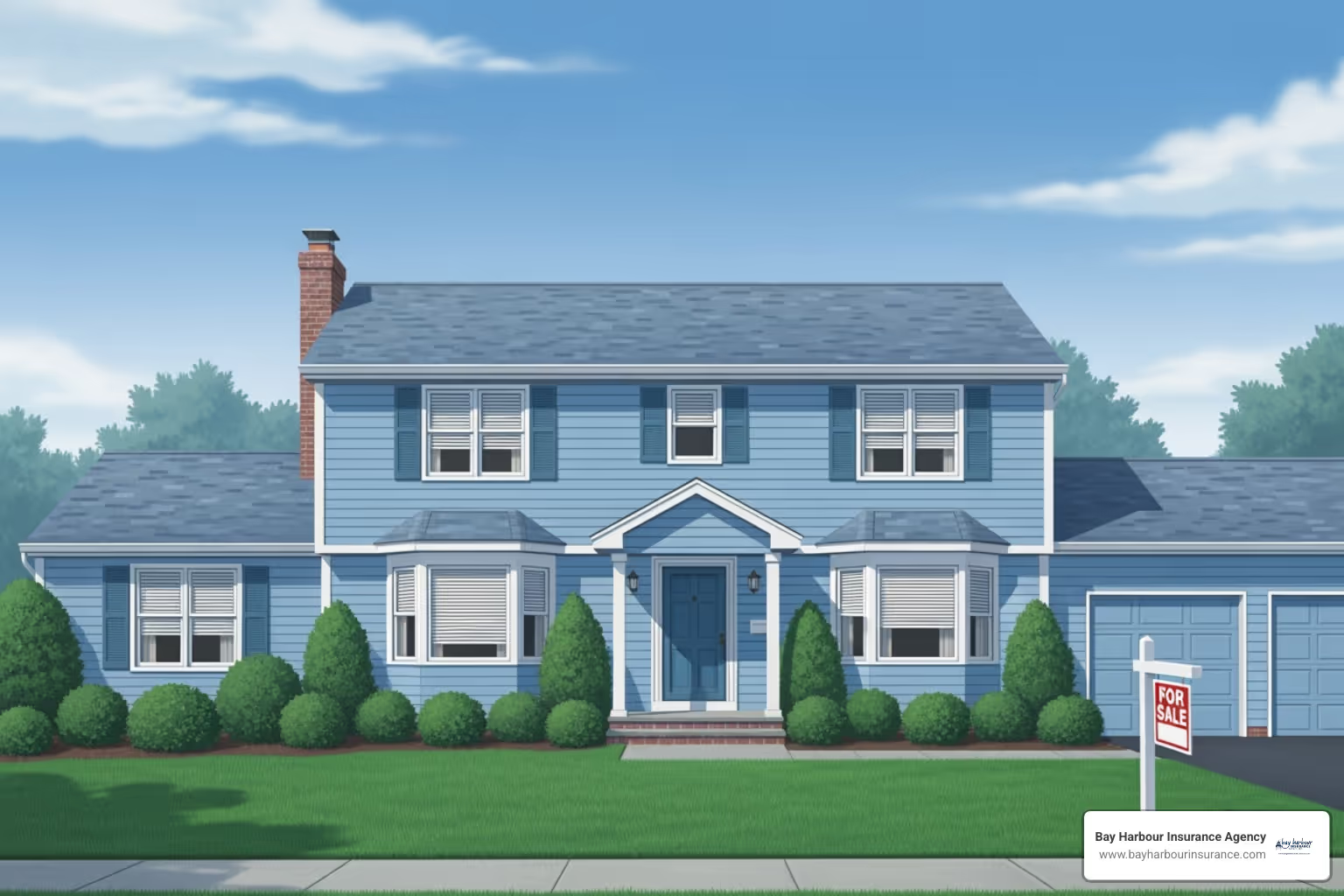
The Empty Nest Egg: Navigating Vacant Property Insurance Long Island
October 17, 2025
Why Vacant House Insurance is Essential for Long Island Property Owners
Vacant house insurance is specialized coverage protecting empty properties when standard homeowners policies fall short. For property owners in Patchogue, Holbrook, Holtsville, Medford, or anywhere on Long Island, this coverage can prevent significant financial loss.
Key Facts About Vacant House Insurance:
- Required after 30-60 days of vacancy (standard policies exclude coverage)
- Costs 1.5-3 times more than regular homeowners insurance
- Covers specific perils like fire, wind, and liability (with many exclusions)
- Different from unoccupied - vacant means no furniture or intent to return
- Essential for homes for sale, renovations, inheritance, or rental properties
The challenge is real for Long Island homeowners. If you're selling a home in Medford, inheriting a property in Holbrook, or renovating in Holtsville, your standard homeowners policy likely won't protect you after just 30 days of vacancy.
The financial risk is substantial. Without proper coverage, a burst pipe during a harsh Long Island winter, vandalism, or fire damage could result in tens of thousands in uninsured losses. New York's vacancy clauses are strictly enforced, and insurers regularly deny claims when homeowners fail to disclose their property's vacant status.
In Patchogue and other Long Island communities, vacant properties face unique risks like coastal weather damage and higher rates of theft. The solution is the right vacant house insurance custom to your specific New York location.
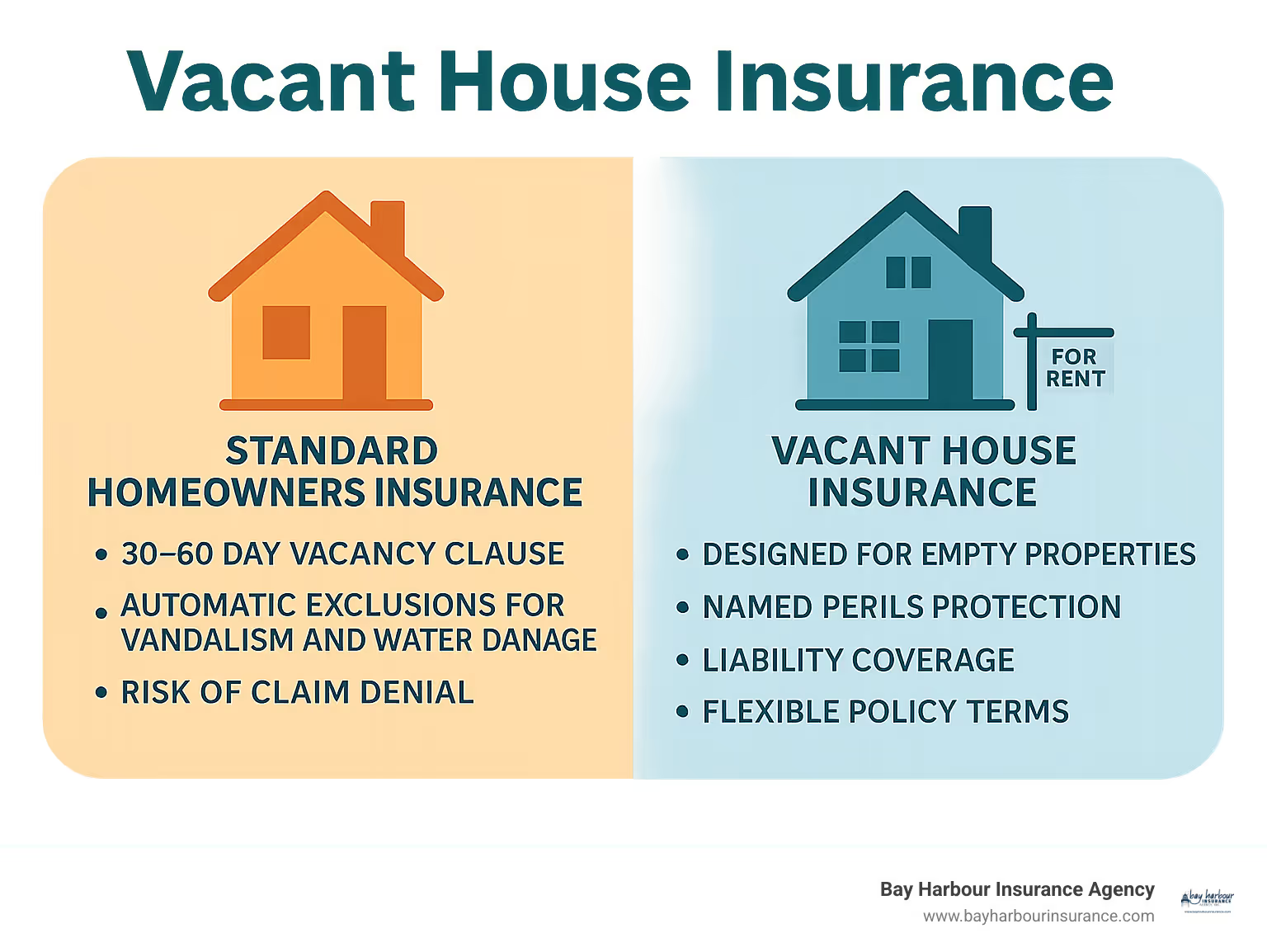
Understanding Vacant Properties and Their Insurance Needs
An empty home in Holbrook or Medford represents a completely different risk profile to insurance companies than an occupied one. Vacant house insurance becomes necessary because insurers view empty properties throughout Holtsville and across Long Island as significantly higher risk.
When no one is home, a small drip can turn into a flood, and there's no one to report suspicious activity. This reality leads to an increased likelihood of undetected damage, vandalism, and theft. Small problems can snowball into major disasters when left unchecked. That's why clear communication with your insurance provider is absolutely essential. At Bay Harbour Insurance Agency, we've seen too many Long Island homeowners caught off guard by coverage gaps they didn't know existed.
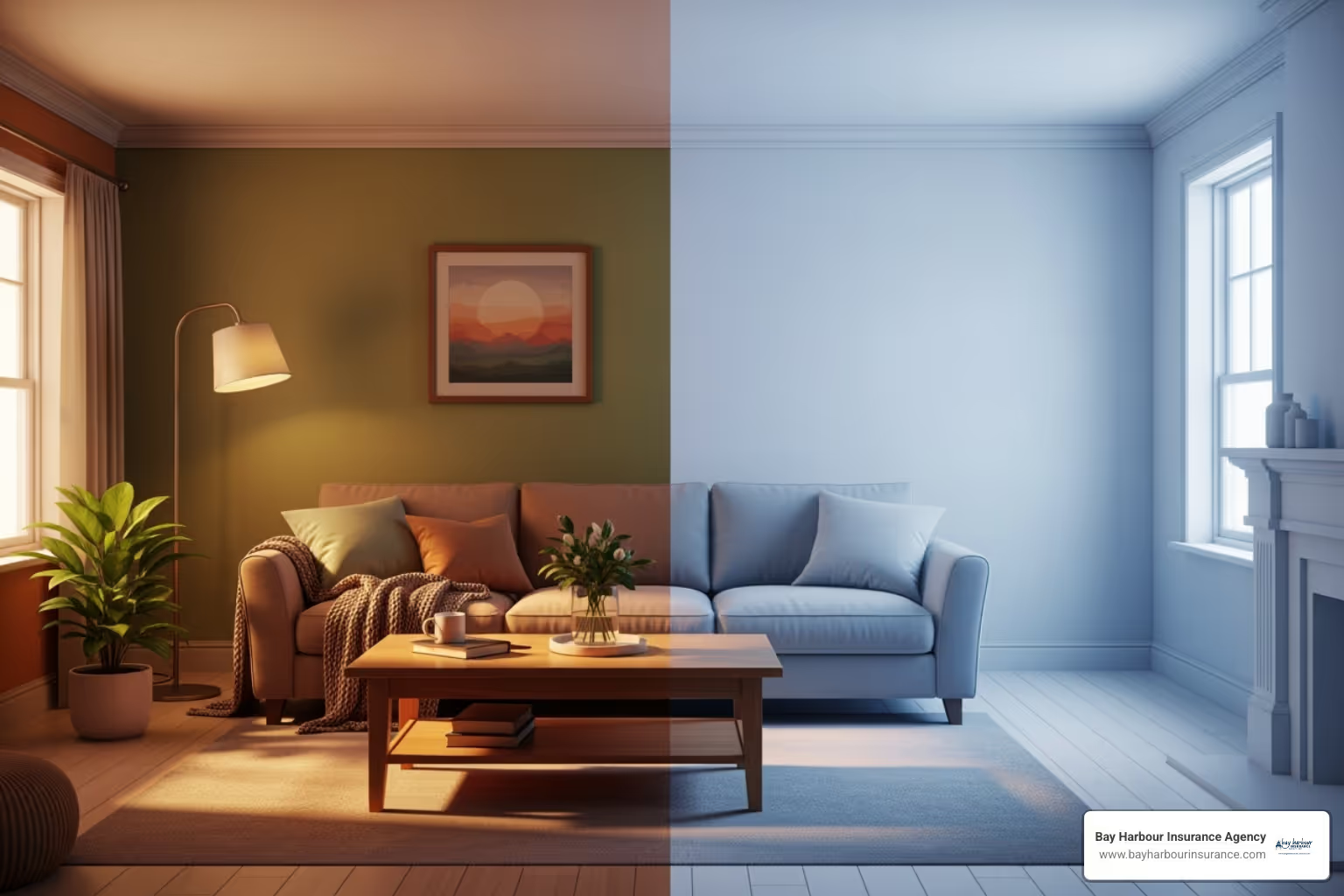
Vacant vs. Unoccupied: A Critical Distinction for New York Homeowners
In the insurance world, "vacant" and "unoccupied" are very different. Many homeowners in Patchogue and Medford get tripped up by this distinction.
Vacant means your property has no occupants and no personal property, with no intent to return soon. Think of a house cleaned out for sale or a rental in Holtsville between tenants.
Unoccupied describes a furnished home where the owner intends to return. This could be a Long Island "snowbird" who heads south for the winter but leaves their furniture and belongings behind.
The insurance implications are huge. Most policies have clauses that trigger after 30-60 days of vacancy, not just being unoccupied. If you move out of your Medford home completely while it's on the market, you could face a coverage gap. This distinction is particularly important for long-term "snowbirds" from Holbrook or other parts of Long Island. A video explaining the difference between vacant and unoccupied homes can help clarify these concepts.
Why Your Standard Homeowners Insurance Basics Policy Falls Short
Standard homeowners policies assume someone lives in the house. Vacancy clauses are built into nearly every policy. The 30-60 day rule means that once your home is empty for this period, many protections disappear, creating significant coverage gaps.
These gaps lead to automatic exclusions for common problems like vandalism, glass breakage, and certain water damage. Imagine finding that your vacant Patchogue home was vandalized, only to learn your policy won't cover it because the house was empty for two months.
The consequences of non-disclosure can be devastating, leading to claim denial and policy cancellation. The specific risks of a harsh Long Island winter, like frozen pipes, make these coverage gaps especially dangerous. The solution is not to hope for the best, but to secure vacant house insurance designed for these unique risks.
What Vacant House Insurance Covers (and What It Doesn't)
Understanding what vacant house insurance protects is crucial for any Long Island homeowner with an empty property in Patchogue, Holtsville, or elsewhere. Unlike standard policies, it's designed for the challenges of an unattended property.
Most vacant house insurance policies are "named perils" policies, meaning they only cover risks specifically listed in the policy. This is different from "all-risk" policies. The insurance company knows what risks they are willing to cover for your empty Medford home and spells them out clearly.
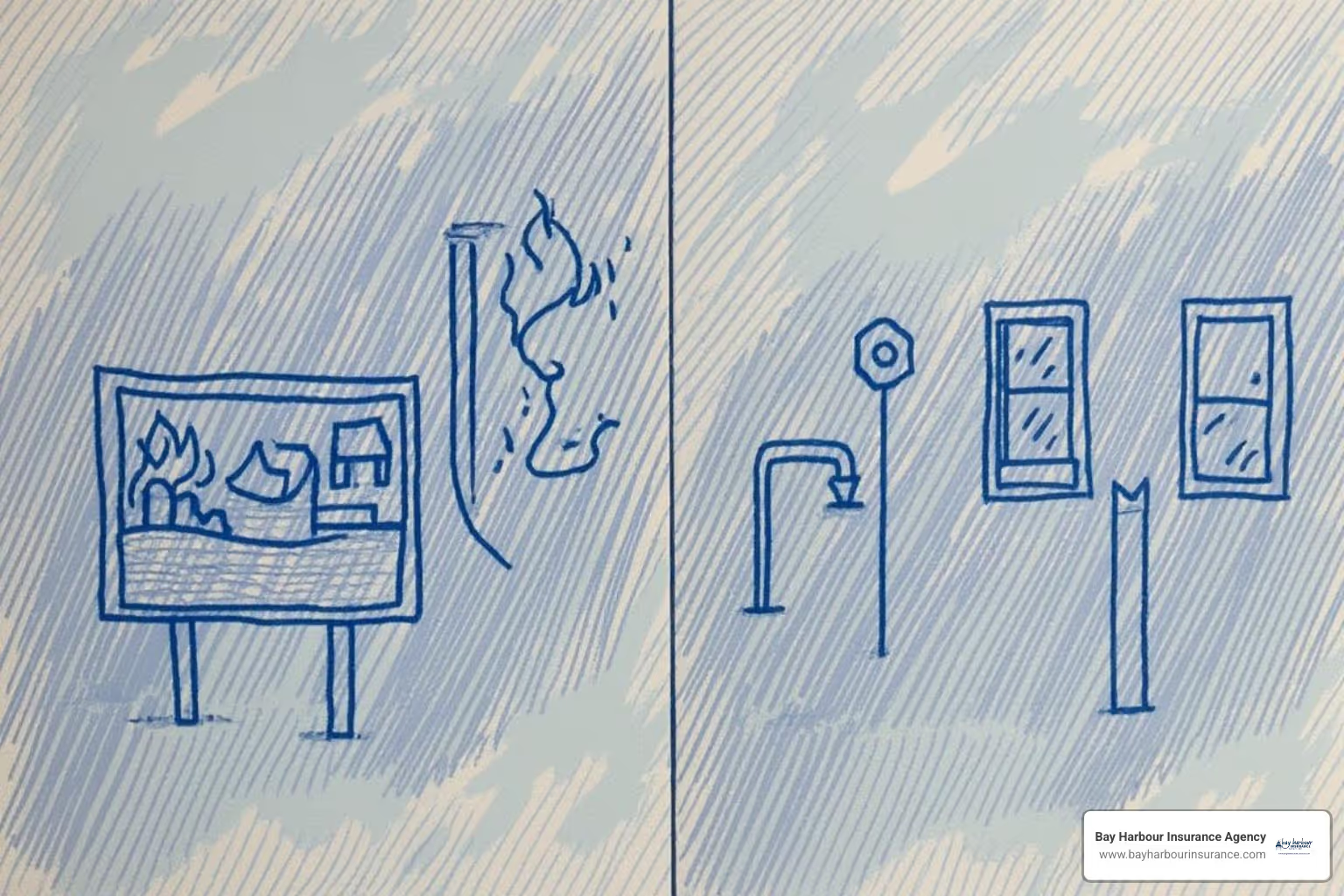
Typical Inclusions in a Vacant House Insurance Policy
The core of a vacant house insurance policy is dwelling coverage—protection for the physical structure. Whether you have an inherited property in Holbrook or a house on the Patchogue market, this is your financial safety net.
Fire protection is critical, as empty homes face a higher risk of fire damage and arson. The high rate of arson in vacant properties makes this coverage essential. Lightning, windstorm, and hail coverage are also vital during Long Island's severe weather seasons, protecting your investment in Holtsville or Medford.
Liability coverage remains essential even when a house is empty. If someone is injured on your vacant property, you could face significant legal and medical costs. The risks of unauthorized entry and accidents don't disappear just because your house is empty.
Policies can be a standalone vacant house insurance policy or a vacancy permit endorsement. We help Long Island homeowners find the flexibility they need.
Common Exclusions to Be Aware Of
Understanding what vacant house insurance doesn't cover can save you from surprises. These exclusions exist because of the heightened risks of vacant properties.
Water damage from burst pipes is the biggest exclusion. During harsh Long Island winters, frozen pipes can burst and flood a Holbrook home, and most vacant property policies won't cover it.
Vandalism and malicious mischief are also significant coverage gaps, typically excluded unless you purchase an endorsement. Empty homes in areas like Patchogue are easy targets.
Theft of building materials and copper piping is increasingly common in vacant homes. Glass breakage from vandalism also falls under common exclusions. The key is working with an experienced agent who can help you build appropriate coverage for your specific situation anywhere across Long Island.
Scenarios, Costs, and Finding the Right Vacant House Insurance
Homeowners across Holbrook, Holtsville, and Medford often face the challenge of an empty house. Understanding when you need specialized coverage and what it might cost can save you from significant financial stress.
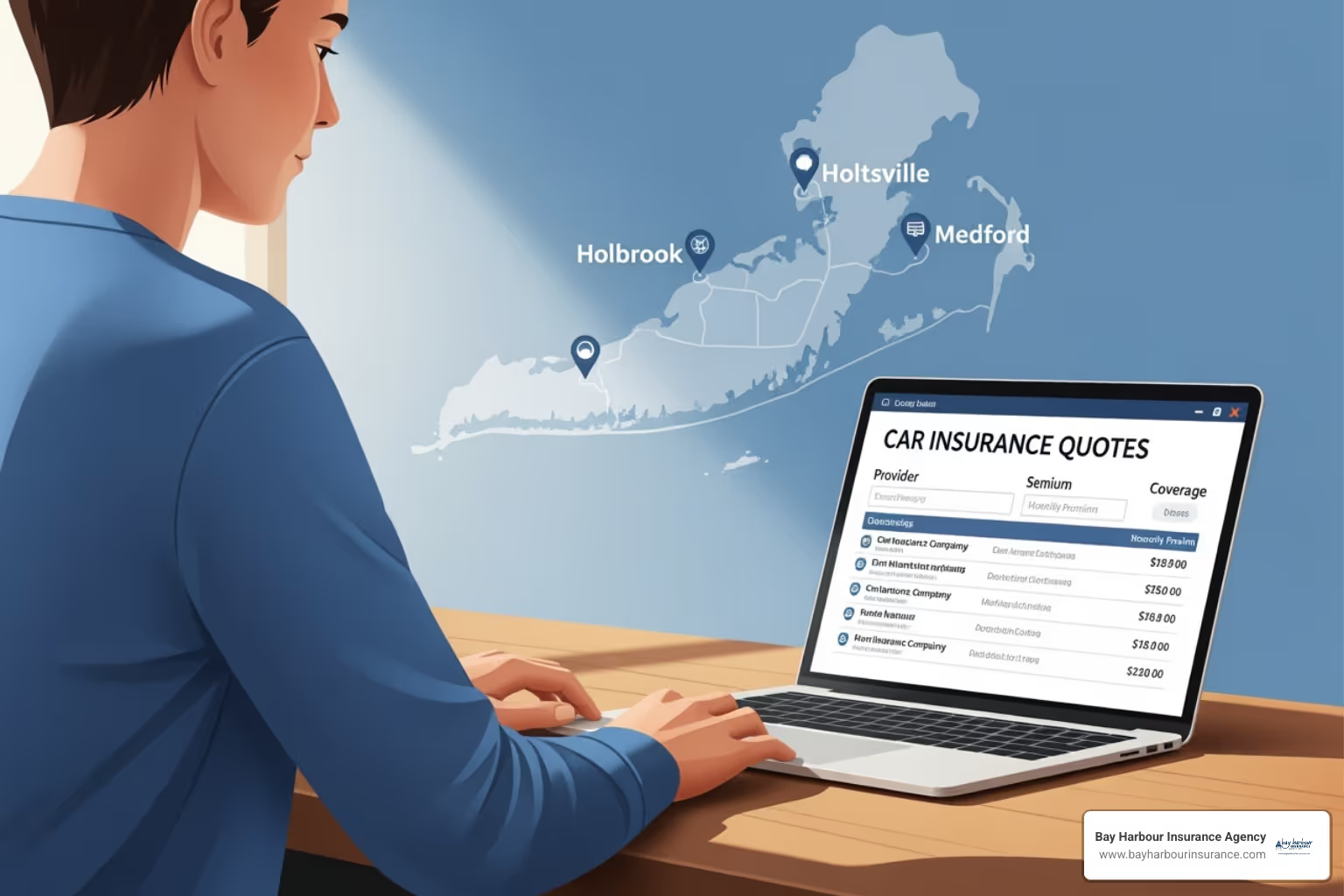
Vacant properties are increasingly common across Long Island. Knowing when you need vacant house insurance is key.
When Do You Need Vacant House Insurance in Long Island?
Here are real-life situations where this insurance becomes your safety net in New York.
Selling a home is a common reason. If you've moved but your previous house in Medford is still on the market, your standard policy may no longer provide adequate protection.
Inheriting a home brings unique challenges. If you've inherited a property in Holbrook and need time to decide its future, the house needs protection while it sits empty during the probate process.
Major renovations often require relocating. If you move out of your Patchogue home during construction, your property becomes vacant in the eyes of your insurer.
For landlords between tenants, vacant periods are part of the business. Those empty months in your Holbrook or Holtsville rental need coverage.
Life events like extended travel or long-term medical stays can also leave your Long Island home empty and in need of protection.
Factors Influencing the Cost of Your Policy
Yes, vacant house insurance costs more than a standard policy—typically 1.5 to 3 times more. This reflects the real increase in risk.
Location matters for Long Island properties. A home in Medford near the coast has different risks than one further inland in Holtsville.
Duration of vacancy plays a huge role. Insurers offer short-term policies (e.g., 3-month terms) or long-term coverage.
Security measures can lower your costs. Monitored alarms, motion-sensor lights, and security cameras reduce risk and can lower your premiums.
Regular inspections are often required but also demonstrate responsible property management, which can help keep costs manageable.
Your home's age, condition, and value also influence pricing. A well-maintained newer home in Patchogue will typically cost less to insure. For more context, you might find our guide on how much home insurance costs in New York helpful.
While vacant house insurance isn't cheap, it's far less expensive than paying for major damage out of pocket. We work with you to find coverage that fits your needs and budget.
Proactive Steps: Managing Risk and Maintaining Coverage
Having the right vacant house insurance is crucial, but proactive steps to manage risk are just as important. This is especially true for homes in Patchogue or any Long Island community, where vigilance is key.
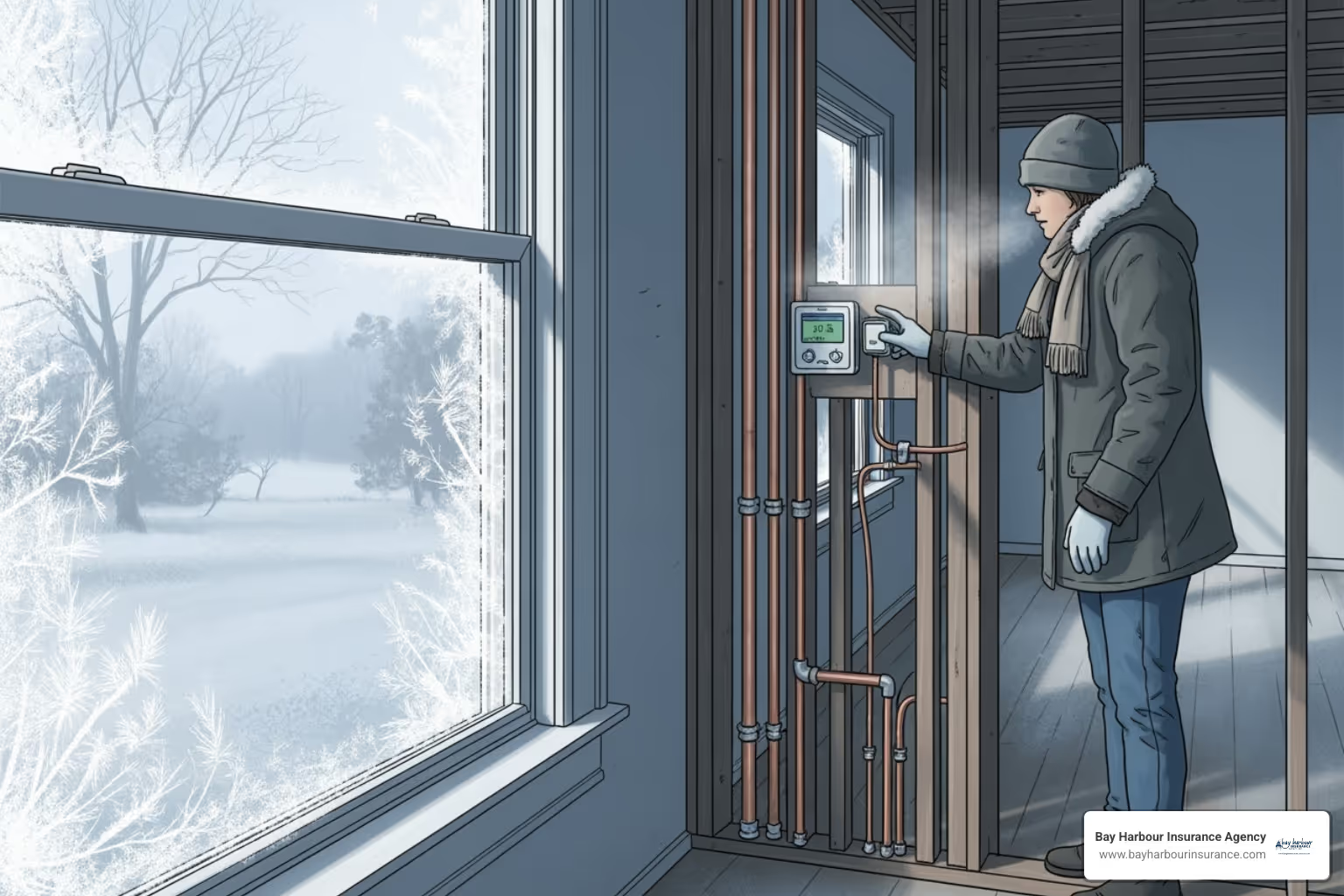
Mitigating Risks to Protect Your Investment
When your property is empty, it needs extra care. Here’s how to mitigate risks:
- Security systems: Invest in monitored alarms, motion-sensor lights, and cameras to deter intruders. Vacant homes are prime targets for theft.
- Regular inspections: Most vacant house insurance policies require someone to check on the property regularly, which is crucial for catching small issues early.
- Property maintenance: Make your home look occupied. Keep up with lawn care, remove snow, and pick up mail. An unkempt exterior signals vacancy.
- Winterizing your New York home: For homes in Holbrook, Holtsville, or Medford, protecting against freezing pipes is paramount. Maintain the temperature around 16°C (61°F). If daily checks aren't possible, shut off the main water supply and drain the lines.
Special Considerations: Renovations and Vacant Land
Some situations have distinct insurance needs.
- Renovations vs. Construction: Minor renovations may be covered by an endorsement. However, larger jobs where the home is uninhabitable are considered construction. If you're undertaking a full rebuild in Patchogue, you'll likely need a specific Builder's Risk Insurance policy. This covers the structure, materials, and liability during construction.
- Vacant Land Insurance: If you own an empty lot on Long Island, vacant land insurance is essential liability coverage. If someone trespasses and gets injured, you could be held liable. This coverage protects you from legal costs and damages related to the lot itself, not any structures on it.
Frequently Asked Questions about Vacant Property Insurance
We often discuss vacant house insurance with our Long Island clients. It can seem confusing, but the basics are straightforward. Here are common questions from homeowners in New York, from Patchogue to Medford.
How long can a house in New York be empty before I need vacant house insurance?
This is a critical question. Most standard homeowners policies have a vacancy clause that activates after 30 to 60 consecutive days of being empty. The exact timeframe depends on your insurer. Once you hit that mark, coverage for risks like vandalism can disappear. Whether your home is in Patchogue or Holtsville, be proactive. We always advise clients to call us the moment they know their home will be empty for more than a few weeks to avoid a denied claim.
Why is vacant house insurance so much more expensive?
From an insurer's perspective, an empty home is a high-risk property. In an occupied home in Medford, a leaking pipe is noticed quickly. In a vacant home, that same leak can run for weeks, causing catastrophic damage. The same logic applies to break-ins, fires, or storm damage on Long Island. There's no one there to catch problems early. Insurance companies have data showing vacant properties generate larger claims, and they price policies accordingly. We can help you find ways to reduce your risk and potentially your premiums.
Can I get coverage for a home I'm renovating in Medford?
Yes, but this situation requires special attention. The moment you move out of your Medford home for a major renovation, it becomes vacant. Your standard policy isn't designed for an empty construction zone. For a major renovation where you've moved out, you'll likely need vacant house insurance in Long Island with a construction endorsement. For more extensive projects, like a full rebuild in Holtsville or Patchogue, a separate Builder's Risk policy might be necessary. We strongly recommend discussing your plans with us before the work begins to ensure you have the right protection without any gaps.
Conclusion: Secure Your Empty Nest Egg in Long Island
Your home is one of your largest financial assets. Protecting it when it sits empty is absolutely crucial. As we've explored, vacant house insurance isn't just another product to consider—it's an essential financial safeguard that steps in when your standard homeowners policy steps back.
The reality for Long Island homeowners is clear. From harsh winters that can burst pipes in Holbrook to the increased risk of vandalism in empty properties in Patchogue, vacant homes face unique challenges. When your home in Holtsville or Medford sits empty for more than 30 to 60 days, you're at risk without the right coverage.
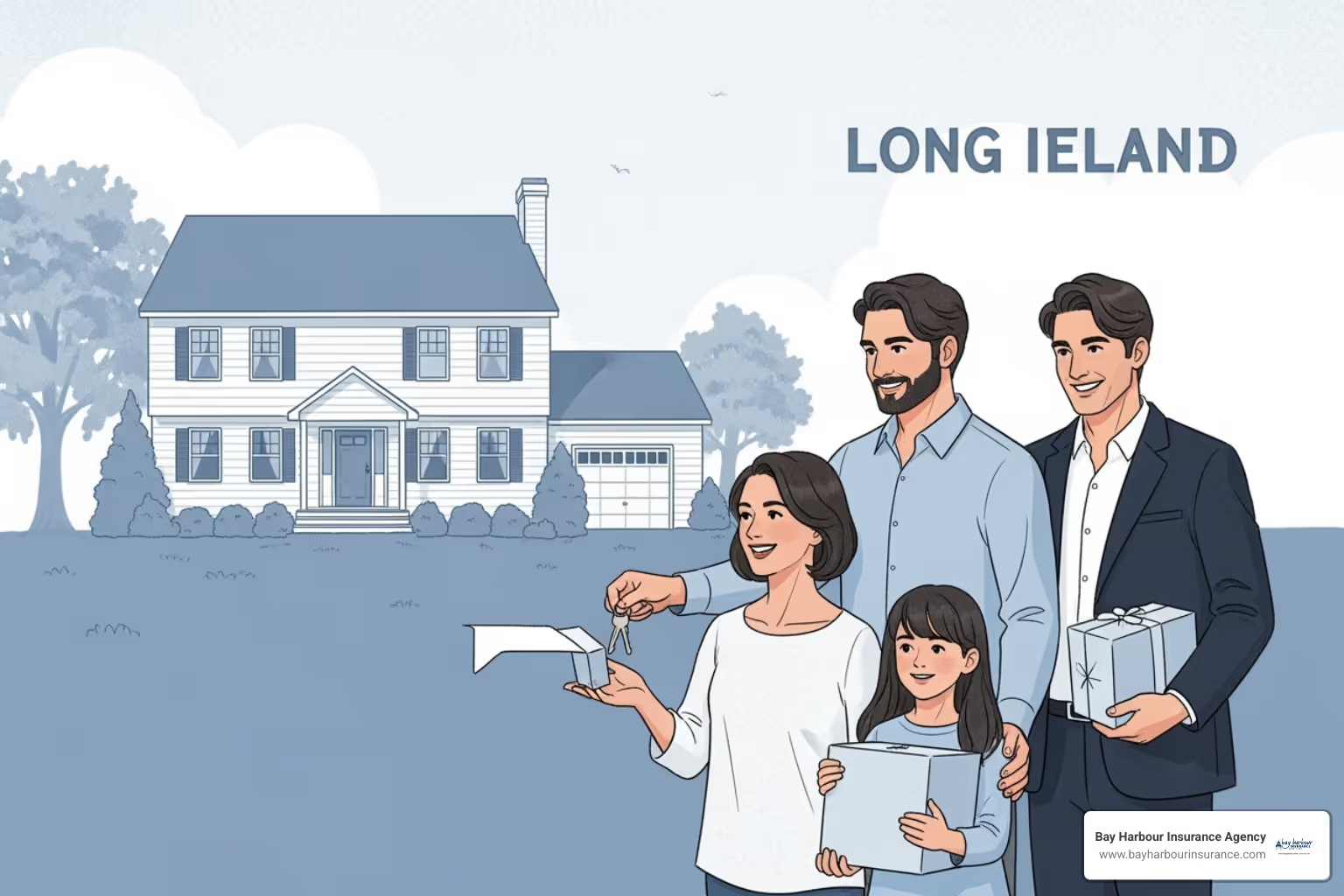
Remember: proactive communication with your insurance agent is your best defense. The moment you know your home will be vacant—whether you're selling, renovating, or dealing with an inheritance—is the time to discuss your coverage needs.
Every situation is different. A family selling a home in Medford has different needs than someone inheriting a property in Holbrook. That's where local expertise makes all the difference.
At Bay Harbour Insurance Agency, we've been protecting Long Island homeowners for years. We understand the specific challenges our communities face, from coastal risks to harsh New York winters. Most importantly, we know each homeowner's situation is unique and deserves personalized attention.
We're here to be your partners in protecting what matters most. Whether your property is in Patchogue, Holbrook, Holtsville, Medford, or anywhere else on Long Island, we provide the local expertise and personal service you need.
Don't leave your vacant property's protection to chance. Contact us for a personalized homeowners insurance quote in New York State and let's discuss how we can protect your investment with the right vacant house insurance.

